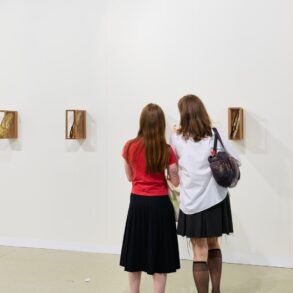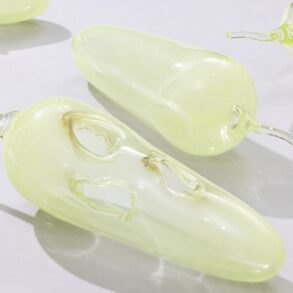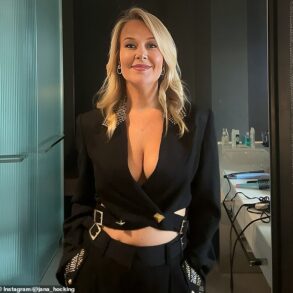Words: Jemima Panjaitan
Photo: Alex Da Corte
The mother of self-expression and art-rock experimentalist, Annie Clark, famously known as St. Vincent shared with us some of her profound reflections as an artist and a queer woman. According to an interview with The Guardian, Clark said “To do interviews and to do press is a construct”, though she chuckled jokingly, Clark herself is synonymous with being pure—just like her latest release ‘All Born Screaming’ explores the losses of life, love and a raw exposé of her sound. The album also showcases her tribute to the late trans producer, songwriter and DJ, SOPHIE, in the song ‘Sweetest Fruit’.
As we eagerly await for the ever-enthralling guitar connoisseur to perform at Joyland Festival 2024 in Jakarta, we hailed in a fresh approach. This time we gathered women in the Indonesian music scene to dig into the world of Annie Clark. Featuring eight dynamic musicians in the industry including Anida Bajumi from the post-metal band Amerta, Mar Galo from the indie rock band Jirapah, Gusti Arirang and Dania Joedo of the folk-rock band Tashoora from Jogjakarta, Friska Dinda of the electro-pop duo White Chorus, the soloist and R&B producer, Noni and Nabila Hanina from the indie band Seaside and Kura Kura Parafin.
Through their questions, Annie shared with us about her process and journey as an artist.
Anida Bajumi: ‘All Born Screaming’ is the first self-produced St. Vincent album, and it took so many vocal takes until it felt perfect for you as no one was there to stop you. Could you share how you determine when a vocal take is perfect enough for your album? What are the moments where you feel it’s just right?
First of all, thank you for the question. It’s not really about perfection—it’s about reaching that place within yourself where you know you’ve given everything emotionally. It’s not about whether it’s perfectly in tune or perfectly in time. It’s about asking yourself, ‘Am I communicating the emotion I’m trying to convey? Did I give it my all?’ Sometimes you find that in the first take—it doesn’t mean you have to sing it over and over again. Sometimes you capture it immediately, and part of the excitement of the song is that you’re discovering it in the moment. You’ll write the lyrics, record two takes, and the song is done. It’s really about honing your inner voice that tells you: ‘This is communicating what I’m trying to express emotionally.’ That’s when you know it’s right.
Mar Galo: As a musician who is known for a unique approach to musical instruments, I have a personal question. I play bass in my band and would like to switch to short-scale bass; do you have any recommendations or preferences?
Well, the bass is such an important instrument. So I commend her for playing bass. It’s also very cool because if I had to choose a member from a band to hang out with, usually the chillest person is the bass player. They are there to support, they glue the whole thing. I have a lot of love for a bassist. As far as short-scale bass goes, my friend and collaborator on this record, Justin Meldell Johnson, has a very cool short-scale Mustang Signature Series Bass that he does with Fender. I like to call it ‘pocket rocket’ and it’s a friendly bass to try. I’ve been wanting to make a short-scale bass of the St. Vincent guitar but we haven’t gotten there yet.
Gusti Arirang & Dania Joedo: Since your latest record is self-produced, there are some places you can only go alone. What did the journey bring you?
I think the journey brought me even closer to my voice as an artist because I was solely responsible for not just the lyrics, the music, the arrangement but also how it all came to be—and every sound was filtered through my lens. I want to say I love collaboration. Collaboration is so exciting, vital and very fruitful. But I think in this case, I was the first and final filter for everything and so I had to know in my bones that it was totally correct or else it didn’t make it in the album. Again, I don’t make it correct as in perfectionistic, I just mean completely nothing is there that doesn’t need to be there.
Gusti Arirang & Dania Joedo: How do you make sure your authentic self, whether the music or your sexuality is well put on your works?
I think for… forever, I’ve just written records about what’s going on with my life, and of course, that includes like, who I am in love with at the time, what’s going on with my family, my friends. Everything is very much personal in that way and some of what I think I’ve dealt with and sublimated my work is the idea of deconstructing persona, identity, the idea of gender and “rockstar”. In music you can go anywhere, in real life sometimes we are hemmed in but in music you’re completely free and you get to explore every emotion that you feel and everything that you don’t even know how to express in any other way. I am so lucky that I have music and it’s been with me and it’s the only place I could go when I could not necessarily navigate the external world that well.
Friska Dinda: How do you balance fan expectations with your personal desire to experiment?
I’ve been very lucky when I think that so many of my fans are also artists, musicians and people making things. With that, there is this trust that we have in us—where my main goal is just to make music that feels righteous and real to me wherever I am in my life. Sometimes that’s very different from record to record but I think we’ve built the trust that goes like: ‘Hey if you go with me I promise to do my absolute best, every time. You might like some records more than other records but trust that I am always following the muse.. and go along the journey with me’ So I guess the short answer is I just make music that’s exciting to me at that time and I just hope and trust that people will come along for the journey.
Noni: What is the most difficult experience you had to go through as a female musician? How did you cope with it?
I will say as I am now seven solo records and one collaboration record in, when I started and when I was growing up, it was still very weird I guess to be a girl playing the guitar. Now though, I am so excited when I see girls nowadays playing the guitar, the bass, the drums, just being like: ‘Of course I can do this, nothing is standing in my way’. Certainly, that wasn’t always the case. If I had to say the most annoying thing about being a woman making music it would be…. I don’t know. In some ways when somebody kind of underestimated me, I’m just like… Oh you’re a clown, let me show you what’s up. I try to sort of diffuse. I think that there’s never been a better time to be a woman in music and every single amazing woman who asked a question today is rad and righteous and they’re only going to make it even easier for the next generation of women to play music, to produce, to play any instrument they want, to be in the business, to do anything they want and I think we really are headed towards progress.
Nabila Hanina: During your early days, were there any female musicians that you look up to—specifically with regards to your music style, your fashion/aesthetics, and your stage acts? In what way did they influence you back then?
Oh my god! So many! Where do I even begin… Fiona Apple, Tori Amos, PJ Harvey, Grace Jones, Elizabeth Frasier, Joni Mitchell, Erykah Badu, Alice Coltrane. The list goes on and on and on.. of just like brilliant women. Sarah Vaughn, Ella Fitzgerald, Beth Gibbons of Portishead, I think I said Elizabeth Frasier already who’s an angel.
This post was originally published on this site be sure to check out more of their content





